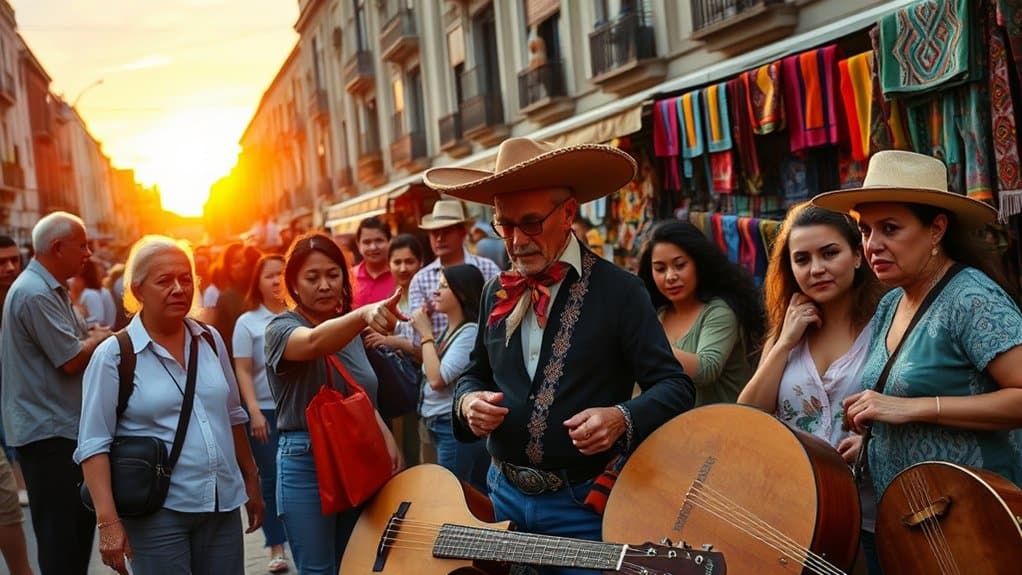Visitors to Uruguay should be conscious of certain taboos, including offensive hand gestures, unusual personal space expectations, and criticism of local customs, which can lead to serious misunderstandings.
Key Takeaways
- Don't use the "OK" hand signal, considered obscene.
- Don't criticize local culture or customs publicly.
- Don't stand too far apart from others unexpectedly.
- Don't arrive late to social events or appointments.
- Don't disturb cultural events or traditions unnecessarily.
Cultural Sensitivities

How does one steer through the intricacies of cultural sensitivities in Uruguay without inadvertently offending the locals? Understanding cultural norms is key, as Uruguayans value respect, modesty, and personal space. To traverse these nuances, respect privacy, and avoid overstepping boundaries. Maintain a comfortable distance, avoid excessive physical contact, and dress conservatively in public spaces. By embracing these cultural norms, individuals can foster positive interactions, build trust, and enjoy a more authentic experience in Uruguay, ultimately allowing them to express themselves freely, without fear of unintended offense, and immerse in the local culture with confidence and sensitivity. It is also important to arrive on time when attending social events, such as dinners, and to show appreciation for the food by complimenting the host.
Social Etiquette
Several key aspects of Uruguayan culture are intertwined with social etiquette, particularly in greetings and communication, where a firm handshake, direct eye contact, and a welcoming smile are standard, while the "OK" hand signal is to be avoided at all costs, as it is considered obscene. In social interactions, respect and thoughtfulness are essential, with gift giving being a small but meaningful gesture, such as sweets or flowers. Uruguayans value considerate behavior, and visitors should be mindful of these customs to steer through social situations effectively, ensuring a positive experience in this freedom-loving country. The country's high literacy rate, with education being highly valued, also contributes to the population's appreciation for respectful and cultured interactions.
Environmental Awareness

In Uruguay, where environmental concerns are increasingly prominent, it is essential to prioritize green energy, as the country has made significant strides in this area, with 98% of its energy coming from renewable sources, including biomass, solar, and wind power. The importance of respecting wildlife cannot be overstated, as the nation's unique biodiversity is threatened by pollution, deforestation, and climate change, which demands a concerted effort to protect and preserve it. By focusing on green energy and wildlife respect, individuals can contribute to mitigating the environmental issues plaguing Uruguay, such as water pollution, deforestation, and heavy metal pollution, which have severe consequences for the health and well-being of both humans and animals. Furthermore, the nation's progress in wind energy is notable, with a significant portion of the demand being met by renewable sources, highlighting the importance of continued investment in sustainable energy solutions.
Green Energy
Uruguay's remarkable progress in green energy is a demonstration of its commitment to environmental consciousness, as the country generates over 98% of its electricity from renewable sources, including hydroelectric power, wind energy, biomass energy, and solar energy. The country's shift towards renewable energy began in 2005, with a focus on hydroelectric power, and has led to significant investments in the sector, driving growth and development in the industry.
| Energy Source | Percentage | Renewable Investments |
|---|---|---|
| Hydroelectric | 31-36% | High |
| Wind | 31-36% | High |
| Biomass | 8-15% | Moderate |
| Solar | 3-6% | Low |
| Total | 98% | Significant |
Uruguay's energy policies support renewable investments, driving growth.
Wildlife Respect
Most of Uruguay's land is being utilized for agriculture and industry, resulting in significant environmental concerns, specifically with regards to wildlife respect, as nearly 80% of the country is dedicated to cattle ranching, which severely reduces natural areas, thereby threatening the delicate balance of ecosystems, and ultimately, the very existence of various species. Relaxing hunting regulations, such as permitting night hunting, harms wildlife conservation efforts, undermining the protection of species, and highlighting the need for stricter laws to preserve Uruguay's biodiversity, ensuring freedom for future generations to thrive in a balanced ecosystem, with effective wildlife conservation. The country's main animal welfare law, Law 18471, emphasizes the importance of animal welfare and responsible ownership, and its implementation could positively impact the environment by promoting a culture of respect for all living beings.
Dining and Food
When it comes to dining and food in Uruguay, several key aspects require attention, including food choices, local cuisine, and traditional dishes, all of which can be overwhelming for visitors. Understanding these elements is essential, as they play a significant role in the country's culture, and making incorrect choices can lead to unintentionally offending locals, which is easily avoidable with proper knowledge, patience, and consciousness. By examining food choices, local cuisine, and traditional dishes, individuals can better maneuver the intricacies of Uruguayan dining, making their experience more enjoyable, and respectful, of the local customs, norms, and values. The tradition of drinking mate is an integral part of social gatherings and daily life in Uruguay, highlighting the importance of cultural immersion through local rituals.
Food Choices
Dining etiquette in Uruguay is a intricate, multifaceted aspect of the country's culture, requiring attention to detail, respect for tradition, and a willingness to adapt to local customs. When making food choices, considering local ingredients, food preferences is vital, as it reflects an understanding of the culture. Uruguayans value their traditional cuisine, and respecting these preferences is essential. By being mindful of local ingredients and food customs, individuals can traverse the intricate dining scenery with confidence, avoiding unintended offense, and fostering a positive experience, which is fundamental for a liberating and enjoyable experience in Uruguay. Understanding table manners is also crucial in Uruguay, as it helps individuals navigate complex social situations and avoid unintentionally offending their hosts or guests.
Local Cuisine
Uruguayans steer through their local cuisine with a deep understanding of tradition, culture, and respect for customs, fuse intricately with the country's heritage, and a strong sense of national pride. They enjoy Uruguayan wines, rich Asado traditions. Uruguayans often participate in unique customs such as drinking Yerba Mate on a daily basis.
| Food | Tradition | Culture |
|---|---|---|
| Asado | Family gatherings | Respect |
| Wine | Social events | Heritage |
| Meat | Daily meals | Pride |
| Pastries | Special occasions | Joy |
| Desserts | Family time | Love |
They value their dining culture, with unique customs, and protocols.
Traditional Dishes
Traditional dishes in Uruguay are a reflection of the country's rich cultural heritage, deeply rooted in customs and traditions that have been passed down through generations, influencing the way individuals eat, interact, and socialize, building on the strong foundation of local cuisine that has been shaped by history, geography, and national pride. Uruguayan traditional flavors, a key part of the country's culinary heritage, are characterized by hearty meals, often featuring meat, pasta, and seafood. Respecting these customs is vital, as they embody the nation's values, and understanding them is essential to truly experiencing Uruguayan culture, with its unique blend of traditional flavors. The country's love for dulce de leche is evident in many desserts, making it a staple in Uruguayan baking and dessert-making traditions.
Community and Events

As they traverse the intricate social environment of Uruguay, visitors would do well to remember that community interactions are fraught with potential pitfalls, unless they take the time to understand the nuances of local customs, including the fact that using the 'OK' hand signal is considered obscene, standing too far apart is seen as unusual, and criticizing the culture or customs is taken very seriously, which can lead to unintended offense. At community gatherings, respect for event timing is essential, as arriving on time is considered impolite, and discussions should focus on socializing, not business. It is also important to be mindful of hand gestures when communicating, as they can convey specific meanings and impact the outcome of interactions.
Travel and Exploration
Having traversed the intricacies of community interactions, visitors now face a new set of challenges in the realm of travel and exploration, where road safety, vehicle selection, and consciousness of local conditions are paramount, requiring a significant amount of research, preparation, and caution to avoid accidents, especially at night, when poor street lighting can be a major hazard. To ensure freedom of movement, prioritize road safety, choosing official taxis or public transportation, and exercise caution with vehicle selection, opting for newer vehicles with safety features like airbags, ultimately taking control of one's travel and exploration experience in Uruguay. The importance of being up-to-date on vaccines is also worth considering when navigating the landscape of Uruguay, as certain diseases may be present in the region.
Local Customs

Local customs in Uruguay are intricate, multifaceted, and demand attention to detail, because understanding them is essential for visitors to traverse social situations effectively, and avoid unintended offense, which can arise from something as simple as a misplaced gesture or a misunderstood etiquette rule. Greeting behaviors, such as firm handshakes and hugs, vary depending on the relationship. Respect for personal space is also vital, as individuals stand close and may touch while talking. Visitors should be mindful of these customs to steer through social interactions with ease, and avoid unintentionally offending locals, by being conscious of their greeting behaviors and respecting personal space. Uruguayans take pride in their distinct qualities, such as maintaining a peaceful nature that is reflective of the country's overall character and is considered a point of national pride.
Cultural Traditions
Uruguay's cultural traditions are deeply ingrained, multifaceted, and demand respect, because failing to understand them can lead to unintended offense, which can be triggered by something as simple as disturbing a cultural event or misinterpreting a symbolic act. Respecting mate traditions, such as the symbolic act of sharing, is vital. Similarly, carnival customs, like comparsas, require consideration, avoiding interruptions or inappropriate behavior. Understanding these customs is essential to avoid offending locals, and to truly experience Uruguay's unique culture, one must be mindful of these nuances, respecting the country's heritage, and its community's values, and traditions. The national love for football is also a significant part of the culture, and visitors should be aware of this to fully appreciate the local way of life.



